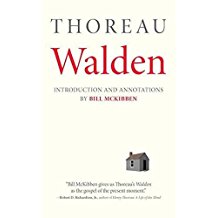Walden, Henry David Thoreau, 1854 (new edition 2004, Bill McKibben introduction)
How does one summarize the experience of reading a true American classic which is front and center this year due to it being Thoreau’s 200th birthday? Bottom line is that this book would have benefited from some good editing, but is so chock full of great one-liners that I was happy to put up with some of the wordy digressions about his neighbors, the price of nails, the woodchuck he ate, hoeing his beans, etc. Thoreau went to the woods to ‘live deliberately, to front only the essential facts of life, and see if I could not learn what it had to teach, and not when I come to die, discover that I had not lived.” He sought solitude, quiet, freedom from the established wisdom and customs of the time, freedom from spending ‘the best part of one’s life earning money in order to enjoy a questionable liberty during the least valuable part of it.” He sought a ‘broad margin’ to his life to read, think, explore, experience, and just ‘look at his wood pile with affection’. He was extraordinarily prescient anticipating modern problems like student loans and the value of a college education, the constant news cycle driven by gossip not substance, America’s struggle with individual freedom vs social need, the gap between the 97% and 3% (now 1%), the hubris of national pride building stone monuments rather than doing good, environmental degradation driven by money, and the endless drive for growth, more, and more. He also anticipated today’s mindfulness movement with his emphasis on the appreciating the present rather than ruing the past, standing on the present moment, and the ability to improve your life with ‘consciousness’. One could fill a book with epigrams from this work. Suffice it to say, that it was worth the effort and returning to its pages, now and then, is the plan.



